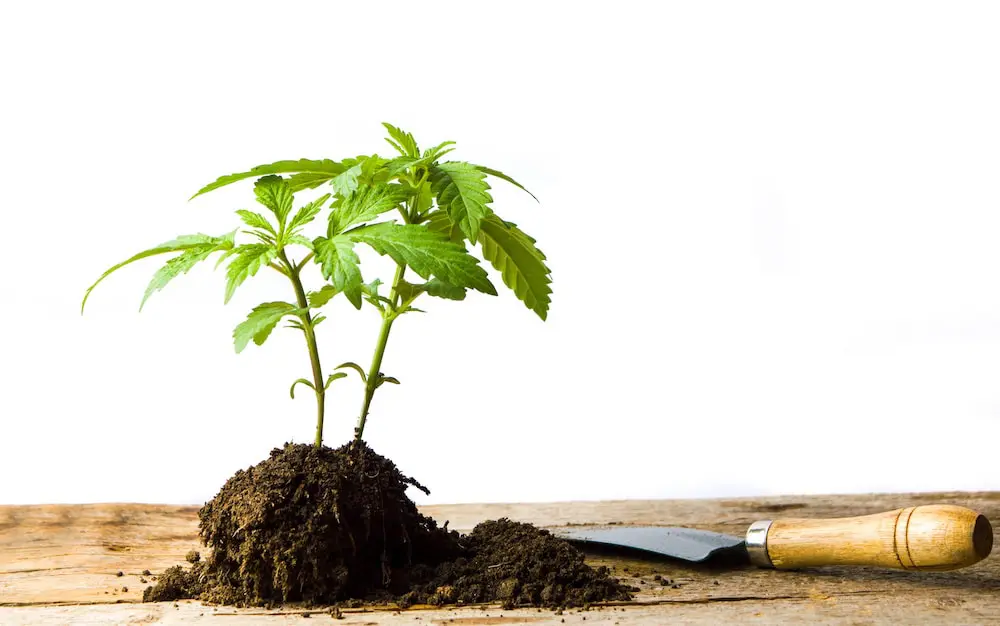The journey to cultivating high-quality cannabis begins beneath the surface, with the critical choice of soil. This foundational aspect significantly influences the health and yield of cannabis plants. Ideal soil nurtures the roots, supports the plant’s structure, and ensures optimal nutrient uptake. In Canada, where the cultivation of cannabis has flourished following legalization, understanding the specific soil requirements for cannabis is essential for both novice and experienced growers. This blog explores the essential characteristics and components of the best soil for cannabis cultivation, providing a comprehensive guide to preparing your grow medium.
Understanding the Basics of Cannabis Soil
Cannabis plants thrive in soil that provides a delicate balance of nutrients, drainage, and aeration. The optimal soil will closely resemble the rich loam often found in fertile forests, characterized by its dark color, loose texture, and rich organic content. Such soil supports robust root growth while retaining adequate moisture and nutrients to feed the plant throughout its growth cycle.
The ideal cannabis soil should:
- Be rich in organic matter.
- Have a loose, aerated texture that allows roots to expand freely.
- Offer excellent drainage to prevent waterlogging.
- Maintain sufficient moisture between watering sessions.
- Possess a slightly acidic to neutral pH, typically between 6.0 and 7.0, to facilitate the best nutrient uptake.
Key Characteristics of Ideal Cannabis Soil
- Texture and Composition: The physical structure of the soil is paramount for cannabis cultivation. It should be neither too dense nor too fluffy. A compact soil can hinder root development and restrict airflow, leading to poor plant health and lower yields. On the other hand, overly loose soil may not support the plant well or retain adequate water. The addition of amendments like perlite, vermiculite, or sandy loam can enhance the soil’s structure, making it ideal for cannabis roots to thrive.
- Nutrient Content: Cannabis is known for its high nutrient requirements, especially during the flowering phase. While it is possible to start with a commercially available, nutrient-rich soil mix such as Fox Farm Ocean Forest or Coco Loco, these may need supplementary nutrients as the plant matures. Incorporating organic materials such as worm castings, bat guano, or compost can enrich the soil, providing a slow and steady release of nutrients essential for prolonged plant health.
- Drainage and Water Retention: Effective drainage is crucial to prevent root diseases like root rot, which occur in waterlogged conditions. Simultaneously, the soil must retain enough moisture to hydrate the plants between waterings. This dual requirement can be met by using non-soil amendments: perlite improves drainage, whereas substances like coco coir and peat moss enhance the soil’s ability to hold water.
Choosing the Right Soil for Your Cannabis Grow

Deciding on the appropriate soil is a critical step that can be daunting due to the myriad of options available. For many growers in Canada, using a commercial organic potting mix is a reliable choice. These mixes generally offer a balanced array of essential components for cannabis, including drainage amendments and organic matter for nutrient retention. For those who prefer a more hands-on approach, creating a custom soil mix allows for greater control over the growing medium’s properties. This involves understanding the role and proportion of each component:
- Sphagnum Peat Moss: Often used as a base in soil mixes due to its excellent water retention and aeration properties.
- Coco Coir: Derived from coconut husks, coco coir is favored for its moisture retention capabilities and resistance to fungal growth, making it a beneficial component of cannabis soil.
- Perlite: These lightweight volcanic rocks are crucial for improving soil aeration and drainage, helping to prevent soil compaction.
- Composted Organic Matter: Adding compost, such as manure or decomposed leaves, can significantly enhance the soil’s fertility, providing a rich source of nutrients to cannabis plants.
Understanding and selecting the right soil components will set the foundation for a successful cannabis grow, ensuring that plants have the ideal conditions to produce bountiful yields and potent buds. Whether in a professional grow op or a personal garden in Canada, the correct soil choice is pivotal to cultivating premium cannabis.
Read- The Complete Guide To Germinating Cannabis Seeds
Enhancing Soil with Organic Amendments
While starting with high-quality commercial soil provides a good foundation, optimizing it with organic amendments can significantly boost the health and productivity of cannabis plants. Organic amendments not only improve soil structure and nutrient content but also enhance microbial life, which is crucial for nutrient absorption. Here are some of the most effective organic amendments for cannabis soil:
- Worm Castings: Rich in nutrients and beneficial microbes, worm castings are a top choice for organic cannabis cultivation. They slowly release nutrients, which helps prevent nutrient burn, a common issue with more potent fertilizers. Additionally, worm castings improve soil structure, enhancing aeration and moisture retention.
- Bat Guano: As a fast-acting fertilizer, bat guano is excellent for promoting vigorous plant growth and flowering. It is high in nitrogen, phosphorus, and potassium, which are essential for the developmental stages of cannabis. Bat guano also helps improve soil texture and fertility.
- Bone Meal: High in phosphorus, bone meal is beneficial during the flowering stage of cannabis. It helps strengthen plant roots and enhances flower development. Bone meal also contributes to the overall fertility of the soil by providing essential minerals.
- Blood Meal: A powerful nitrogen source, blood meal is ideal for the vegetative growth phase of cannabis. It helps in producing lush, green foliage. However, it should be used sparingly to avoid nitrogen burn, which can damage the plants.
- Fish Meal: With a balanced supply of nitrogen, phosphorus, and potassium, fish meal serves as a well-rounded amendment that supports all stages of cannabis growth. It also contains trace elements necessary for plant health, enhancing overall vigor and resistance to disease.
- Composted Organic Matter: Adding well-composted organic matter, such as leaf mold or decomposed manure, can dramatically increase soil’s nutrient profile and improve its structure. This not only feeds the plants but also nurtures the soil’s microbial life, essential for organic growing.
Balancing Water Retention and Drainage
Achieving the right balance between water retention and drainage is pivotal for healthy cannabis roots. Overly wet soil can lead to root rot, while too dry conditions can stress the plant and stunt growth. Here are some tips for balancing moisture levels:
- Use Perlite and Vermiculite: Perlite increases soil drainage and aeration, preventing waterlogging. Vermiculite, on the other hand, enhances water retention. Using a mix of both can provide an optimal environment for cannabis roots, allowing for steady growth and nutrient uptake.
- Adjust with Coco Coir or Peat Moss: Both coco coir and peat moss are excellent for moisture control. Coco coir is particularly useful in preventing the soil from becoming waterlogged while still retaining ample moisture. Peat moss helps in maintaining moisture and slowly releases it to the plant roots, ensuring that they are hydrated but not waterlogged.
Monitoring Soil pH
The pH level of the soil is critical in cannabis cultivation as it affects the plant’s ability to absorb nutrients. Cannabis prefers a slightly acidic pH between 6.0 and 7.0. To maintain this range:
- Regular Testing: Use a pH meter to regularly test your soil’s pH level. This helps in making timely adjustments before nutrient lockouts or toxicities occur.
- Adjusting pH: If the soil is too acidic, adding lime can help raise the pH. If it’s too alkaline, sulfur or aluminum sulfate can lower the pH to a more desirable level.
By carefully selecting and balancing these amendments and conditions, growers can create a rich, dynamic soil environment that cannabis plants will thrive in. The attention to detail in the preparation and maintenance of the soil can lead to robust plant growth, optimal flowering, and ultimately, a higher yield of quality cannabis. This thorough approach ensures that each plant reaches its full potential, providing bountiful harvests that are rich in aroma and potency.
Tailoring Soil for Specific Cannabis Strains
Different cannabis strains may have unique soil preferences, especially when it comes to nutrient uptake and moisture levels. Indica strains, for example, might thrive in a soil mix that retains more moisture, while sativa strains often prefer well-drained, aerated soil to prevent root diseases common in their longer growing cycles. Understanding the specific needs of your strain can significantly impact the success of your cultivation efforts. Here are a few steps to tailor your soil:
- Research Your Strain: Look into the natural habitat and soil conditions of the strain you are growing. This can provide valuable insights into how you can adjust your soil mix for optimal results.
- Customize Soil Mix: Based on your research, modify your base soil mix by adjusting the ratios of perlite, coco coir, peat moss, and organic amendments. This customization allows you to create the ideal growing conditions for your specific strain, ensuring it receives the right balance of nutrients, water, and aeration.
- Experiment and Observe: Even within the same strain, individual plants may show different preferences. Experimenting with small adjustments and observing the responses can help you fine-tune your soil to individual plant needs, leading to better overall health and productivity.
Maintaining Soil Health Throughout the Grow Cycle
Maintaining the health of your soil throughout the growing cycle is crucial for sustaining high yields and potent cannabis. Soil that is well-cared-for supports not only the current crop but also improves the growing conditions for future cycles. Here are essential practices for maintaining soil health:
- Regular Amendment: Replenish nutrients in the soil by regularly adding organic amendments. This is particularly important after each grow cycle to restore the soil’s nutrient levels.
- Crop Rotation and Cover Crops: If possible, practice crop rotation with plants that replenish nutrients in the soil, such as clover, which fixes nitrogen. Cover crops can also prevent soil erosion and help maintain its organic content.
- Avoid Overwatering and Overfeeding: Monitor your watering and feeding schedule closely. Overwatering can lead to oxygen-deprived roots and nutrient uptake issues, while overfeeding, especially with chemical fertilizers, can lead to nutrient burn and soil imbalance.
Conclusion
Choosing and maintaining the right soil for cannabis cultivation is a blend of science and art. It requires a deep understanding of what makes soil suitable for cannabis, meticulous attention to detail, and an ongoing commitment to adapt and improve the soil environment. For growers in Canada, where diverse climates and legalities support the growth of various cannabis strains, optimizing soil conditions is key to leveraging the full potential of their crops.
The journey from selecting the right soil to adjusting it for specific strains and maintaining its health is critical for achieving high-quality, potent cannabis. With the right soil, growers are well on their way to cultivating plants that are not only vibrant and healthy but also capable of producing the rich, aromatic buds that are highly sought after in the market.
By following these detailed guidelines and continuously learning from each grow cycle, cannabis cultivators can ensure that their soil remains a strong foundation that supports thriving cannabis plants. Ultimately, the quality of the soil reflects directly in the quality of the cannabis it grows, making it essential to give your plants the best possible start and support throughout their lifecycle.
